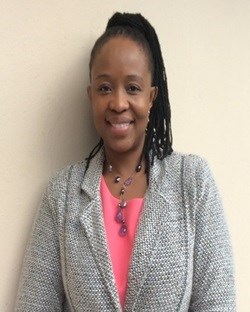The Water Research Commission recently hosted a dialogue on the "Empowerment of women through water use security, land use security and knowledge generation for improved household food security and sustainable rural livelihoods" as gender issues are starting to play a greater role in agriculture and food security policies with.

Dr Joyce Chitja
According to an IPS article, "African women are in charge of the majority of households and are key food producers. They represent more than 43 percent of the agricultural labour force in addition to playing a major role in managing poultry, dairy animals, fisheries, aquaculture, and the marketing of handcrafts and food products." Therefore, it is critical for women to gain access to productive resources such as land, modern inputs, technology, education and financial services.
At the WRC dialogue, Dr Joyce Chitja spoke about "empowerment of women through water use security, land use security and knowledge generation for improved household food security and sustainable rural livelihoods." We asked her to share some insights with us:
Women have always played a pivotal role in household food security and rural livelihoods, but recently it seems that the role of women is enjoying greater focus. Why do you think that is, what has pushed this change?
Joyce Chitja: The statement is true, it has always been women. I think the greater focus is a combination of factors ie. increased research interest in household food security among the poor by research funders, government, the realisation from the policy arena that local and context-specific solutions to food access and poverty eradication are urgent in a developing economy characterised by deep inequality.
How big of a discrepancy is there between the resources men receive compared to women?
Chitja: There is both a qualitative and quantitative discrepancy. Access to productive resources often takes place along a gender bias. Access to land, water, and finance are largely determined by culturally and socially embedded practices with a bias towards men despite a legislative clarity possible for urban-based women. Land rights in communal areas are often awarded to the male household head while women are mostly the ones who work the land.
What are the most important factors that need to be addressed regarding this issue and how can change be accelerated?
Chitja: Women in rural areas are main food producers for their household, therefore, land rights land and water rights should be awarded directly (not secondarily) to women in all their categories and not via their relatedness to men. Context-specific understanding of social practices and on how women have navigated and negotiated access to land all along needs to be investigated and then built on to inform policy and development programmes. Appropriate finance and marketing models need to be extended to interested women.
What are the biggest challenges women in rural communities are facing that hinder their progress and success in agriculture production?
Chitja: Subsistence and small-scale rural farmers, both men and women, experience a myriad of constraints in making a success in farming. These can be grouped into production, institutional and market constraints. However, for women, gender largely determines the intensity of these known challenges where access can be near impossible due to the barriers being systematically and structurally expressed.
What can be done, and should be done, to empower women not just in terms of greater access to resources, knowledge and support, but to overcoming female stereotypes and traditional gender roles in rural communities?
Chitja: Empowerment is a process to capacitate and enable the other to take control and make decisions on the course of one’s life. Indeed beyond access to resources, knowledge, and support, rural women need capacity enhancement in both human and social capital in order to translate the physical resources into products and income that can improve their livelihoods.
Women live alongside men and interact with men in their households and in the villages, therefore, a solution lies in a process where engagement, negotiation, learning and change can result in agency. However, because of their role in farmer development, the extension service and NGO’s will have to be transformed in their approaches to farmer development. The same applies to other state-holders including traditional authorities and policy makers.
How big of an impact can empowered women have on resource usage, sustainable livelihoods, and household food security as well food security for the nation as a whole?
Chitja: Women are largely nurturers and are interested in the welfare of the whole. These qualities also benefit men in poor households! Women make a larger percentage of the population and head many households in South Africa’s poor rural areas. As the main food producers in these areas, secure access and rights to productive resources can only be positive and lead to sustained livelihoods.
Producing better food as they have improved access to land and importantly water for household food production, young children’s nutrition security will improve. There will be a positive impact on the health and economic burden on the state both in the short and long-term due to improved cognitive development of children and health of children and adults.



































